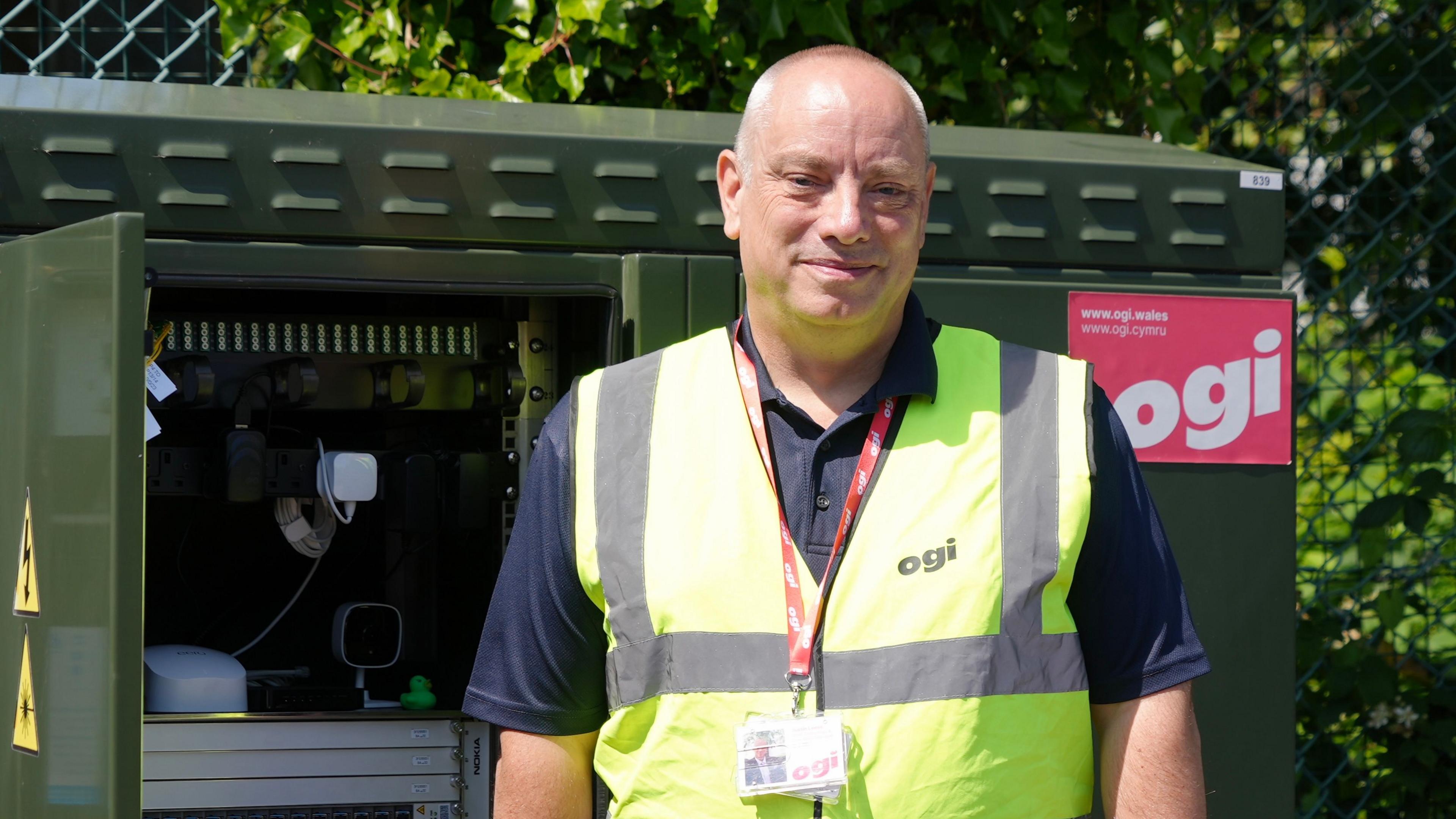What it's like being a popstar with slow broadband

Macy Landon-Jones - who performs as MACY - uses the internet to upload songs and work with other songwriters
- Published
Patchy broadband across Wales makes it harder for artists to achieve pop stardom, according to a singer-songwriter.
Macy Landon-Jones, 23, performs as MACY and relies on her slow connection at home in Abertillery, Blaenau Gwent, to upload large music files and work with writers online.
Abertillery has some of the slowest broadband speeds in Wales - where average speeds are slower than the UK as a whole.
There is a big difference between average speeds in different parts of the country, and political parties are pledging to improve the situation.

MACY is among a generation of artists who rely on the internet to promote their work
Macy said she was nine when she decided to pursue her dream of becoming a music artist
And access to the internet has been "really important" in making it happen, she said - and has helped her songs hit more than one million streams.
"I use Instagram, Facebook, YouTube, TikTok, Spotify, all the ones you can list," Macy said.
And it would be "a hundred times easier" to work and promote her music with a faster connection, she added.
"It's really important to reach out to new people and promote gigs and upcoming music, and I upload my music through the internet. So, yeah, it's huge."

Social media has been important for the singer-songwriter to promote her work
Data shows that Macy lives in one of the areas with the slowest average speeds in Wales.
Communities around Abertillery in Blaenau Gwent and Tonypandy in Rhondda Cynon Taf have average speeds of between 47 and 53 megabits per second (mbps). Some households will be experiencing even slower speeds.
The fastest average speeds in Wales are centred around Cardiff, Newport and Swansea in the south, and parts of Flintshire and Denbighshire in the north-east.
The Cathays North area of Cardiff has average speeds of 252mbps according to data from the regulator Ofcom.
The average broadband speed in Wales is slower than the UK as a whole. Data from Ofcom showed Welsh download speeds were 122.9mbps, compared with a UK average of 151.3mbps.
To help improve connection speeds and reliability, communications company Ogi is one of the organisations installing fibre broadband in communities around south Wales.
Its new network of cables is helping to in areas which had suffered with slow or intermittent connections in the past.
"We have focused on under-served areas," Ogi’s Justin Leese said.
As the company's chief technology and operations officer, he has overseen Ogi's decision to install fibre cables in towns from Pembrokeshire to Monmouthshire.
"The average internet speed across Wales is about 112 megabits [per second], but as soon as you get out of the cities, it's more like 50 to 80 megabits," Mr Leese said.
In Tonypandy the company has enabled thousands of homes to get a faster internet connection, a move which should help the area to lose its reputation for having some of the slowest broadband speeds.

Justin Leese says superfast broadband is transforming communities used to slow speeds
Mr Leese said the arrival of superfast broadband was "transformative" for some communities.
"We're bringing speeds that are as good as, if not better than, the speeds available in the cities to communities like this," he said.
Businesses and households now had "the benefits of that capability," particularly when it came to working from home or accessing healthcare services online.
A poor internet connection is more than frustrating for businesses like Hearthside Games in Abertillery, where owner Josh Hill runs table top role-playing events, bringing people into the shop to enjoy playing games such as Dungeons and Dragons, Pokémon and Magic: The Gathering.
Many of the events rely on the internet, with the games guided by an online element that also controls the lighting and soundtrack in the games room.

Josh Hill (right) runs table top games events that rely on the internet
"When the wi-fi goes down, which I pretty much guarantee on a Saturday, it means our resources are completely cut off. It means that the customer's experiences are cut off.
"It also means that our point of sale systems - our card readers - go down, so we can't sell anything," Josh said.
The unreliability of the connection is a predictable part of running his business, and Josh said a fast, stable connection would make a "world of difference" to him.
"You wouldn't have to worry about whether the system will go down," he added.

Political parties are all promising to improve superfast broadband coverage
Funding by UK and Welsh governments has helped cover some of the 'ost of installing superfast broadband connections in communities where it isn’t always commercially viable.
The continuing need for improved connections has meant that the political parties are campaigning on broadband speeds ahead of the general election.
What do the parties say?
The Conservatives and Labour point fingers at each other, having both been in government in Westminster and Cardiff in recent years.
A spokesperson for the Conservatives said the party had delivered "billions in funding for gigabit broadband" and that the "Labour Welsh government [was] lagging behind".
A Labour spokesperson said the Conservatives' investment in 5G was "falling behind other countries, and the rollout of gigabit broadband has been slow", adding that the Welsh Labour government had provided "access to gigabit-capable broadband to more than 121,000 premises".
Other parties also pledged to improve connectivity.
Plaid Cymru said rural areas "suffer the most with poor broadband connections", and it would call on the UK government to "release more Project Gigabit money" to improve connections in areas with little or no access to fast broadband or 4G signal.

The Liberal Democrats said access to fast internet was "vital in today's world, especially as some rural communities want to take advantage of changing working patterns", and that it would use "bespoke solutions" to ensure all households could access superfast broadband.
Reform said access to superfast broadband across rural Wales was "appalling", and it would "encourage collaboration" between government and communications companies to fund better connections "for any community that demands it by 2029".